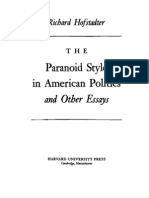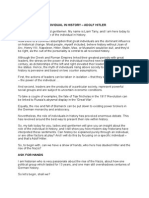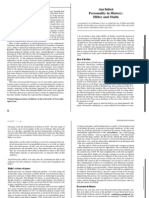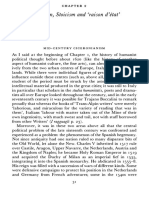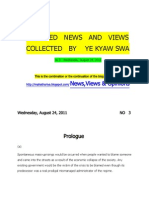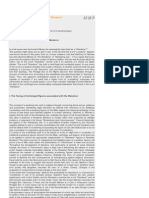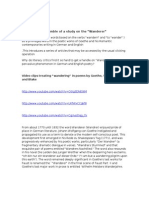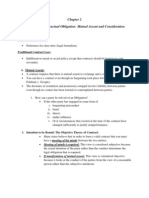Was There A Precursor of Hitlerism in World History?
Was There A Precursor of Hitlerism in World History?
Uploaded by
Julian ScuttsCopyright:
Available Formats
Was There A Precursor of Hitlerism in World History?
Was There A Precursor of Hitlerism in World History?
Uploaded by
Julian ScuttsOriginal Title
Copyright
Available Formats
Share this document
Did you find this document useful?
Is this content inappropriate?
Copyright:
Available Formats
Was There A Precursor of Hitlerism in World History?
Was There A Precursor of Hitlerism in World History?
Uploaded by
Julian ScuttsCopyright:
Available Formats
Hitler and Napoleon. But Which One?
Any number of historians, philosophers and others have raised the question as to w hether Napoleon w as in some sense a precursor of Adolf Hitler. Certainly the disastrous Russian campaigns of both men invite comparison, as do their overw eaning ambitions to master Europe and further afield. Some w ould even go so far as to assert that Napoleon's treatment of black slaves in Haiti anticipates Hitler's genocidal persecution of the Jew s and other minorities. Surely this is overstepping the mark of meaningful comparison. In any case one might consider draw ing parallels betw een Hitler's politcal career and that of a person other than Napoleon I At least as far as the Machiavellian art of manipulating constitutional and democratic procedures is concerned, a w ider basis of comparison emerges w hen one focusses on the political careers of Hitler and Napoleon III, Napoleon I's nephew . (For biographical details consult an encyclopedia or w ork of historical reference, e.g. click:http://en.w ikipedia.org/w iki/Napoleon_III_of_France ). Strangelly enough, Napoleon III and Adolf Hitler share April 20th as their day of birth. As in similar instances in history, this quirk of circumstance might prompt one to reflect on parallels that cannot be readily dismissed as mere coincidences. (For a survey of odd coincidences in history click :http://w w w .w riting.com/main/view _item/item_id/273832 . Of course, Napoleon III, as in the case already considered, displayed nothing of Hitler 's malignancy and desire to glorify w ar. For all his faults Napoleon w as little better or w orse than many another autocratic rulers in recent history and arguably possessed qualities that could even arouse sympathy and admiration. How ever, certain parallels betw een Napoleon and Hitler remain. These may be listed as follow s: Both w ere despotic rulers w ho gained supreme pow er despite immense obstacles presented to them by their social and family origins (but so, one may object, w ere quite a number of others w ho fought their w ay to the top despite similar handicaps, men such as Oliver Cromw ell, Napoleon I, Franco or Lenin). What marks Napoleon III and Hitler out from the others is the ability they evinced in gaining their initial political leverage by exploiting established constitutional instruments and procedures and then abolishing them in order to gain absolute pow er. This they achieved, unlike Cromw ell or Napoleon I, w ithout being military leaders or conquerors. The latter did legitimise his authority by a plebiscite, as indeed did Napoleon IIIand Hitler, but plebiscites legitimise political actions retro-actively rather by means of the due process of standing law s. The ability of Napoleon III and Hitler to exploit and then pervert or abolish the legal procedures devised to regulate the continuation of political authority demands the kind of personality that is bold and audacious enough to seize every opportunity conducive to their aims, that is perspicacious enough to recognize the desires and fears of the respective populace and that is shrew d enough to promise that they can fulfill such desires and allay such fears. Both possessed histrionic skills that allow ed them to sw ay popular feelings, though Hitler's gestures and postures w ere held to ridicule by Charlie Chaplin, w ho used his histrionic genius to entertain and educate mass audiences instead of deluding them Napoleon III pionered use of propaganda to foster a personality cult. Goebels perfected it in Hitler's cause. Napoleon III and Hitler had careers that reveal significant points of resemblance. Both began their political activism by staging abortive putsches. Both learned from this experience that the w ay to political pow er led through accepted legal channels Both became political prisoners in a "romantic" castle setting. Both w ere beguiled by initial military success into believing that they w ere infallible military geniuses. Both experienced their final political demise by attempting to make a heroic last stand against overw helming odds, either in Sedan or Berlin Both shrew dly exploited the sense of national shame and humiliation occasioned by terms agreed at an international conference, be this the Congress of Vienna or the Conference of Versailles. In fairness to Napoleon III it should be stressed that his ambitions, though inspired by a thirst for gloire and aggrandizeiment ,betray little of the lunatic quality of Hitler's passions. it w as his goal to promote France as a leading w orld pow er in concert w ith the w ider interests of w hat he believed to be he Latin w orld , a w orld uniting all w ho spoke a romance language. He evinced caution w hen not pushing Austria into the arms of Prussia after the battle Solverino, doubtless aw are that his Italian campaign might be construed as a case for the German Conferation to take up according to agreements on mutual defence. He retracted his support for Maximilian's claim to be emperor of Mexico w hen the United States w as in a position to maintain the Monroe doctrine once the Civil w ar w as over. True,
he allow ed himself to be provoked into w aging a w ar against Prussia at Bismarck's instigation. The German chancellor shrew dly anticipated that the claim of a Hohenzollern prince to the Spanish throne w ould be seen by Napoleon as a gross affront to French claims to hegenomy in Spain and the Latin w orld. What explains the parallels so far considered? We must problably view the careers of these men w ithin a w ide historical context, taking account of the breakdow n of a belief in the divine right of kings and its replacement by the notion that political authority is vested in the national or popular w ill. This understanding provides the basis of democratic government, but also of deviant theories and practices realized by those w ho have laid claim to personifying the popular w ill and acting as its defender and agent. For such men as they, democratic procedures may prove useful as a means to achieving "a greater end." Such men have also sough to overcome the void left by the demise of divine authorty by appealing to the need to restablish a lost empire. Napoleon III felt himself predestined to fulfil this role on the strength of his very name, and by defeating Napoleon and celebrating the inauguration the Second German Empire in Versailles, Bismarck regained the mantle of the Holy Roman Empire w hich Napoleon I had impiously snatched from the House of Hapsburg.
You might also like
- The Face of The Third ReichDocument493 pagesThe Face of The Third Reichbillgseattle92% (12)
- Alan RyanDocument750 pagesAlan RyanShivam Verma100% (2)
- The Paranoid Style in American Politics - Richard HofstadterDocument40 pagesThe Paranoid Style in American Politics - Richard HofstadterCocceius100% (3)
- Primitive EducationDocument5 pagesPrimitive EducationJesus Valenzona Jr.No ratings yet
- A Political Comparison of Napoleon Bonaparte and Julius CaesarDocument6 pagesA Political Comparison of Napoleon Bonaparte and Julius CaesardeeaNo ratings yet
- The Nazi Occult War: Hitler's Compact with the Forces of EvilFrom EverandThe Nazi Occult War: Hitler's Compact with the Forces of EvilNo ratings yet
- 9/11 Synthetic Terror: Made in USA, 5th editionFrom Everand9/11 Synthetic Terror: Made in USA, 5th editionRating: 4.5 out of 5 stars4.5/5 (10)
- Polarity and Ascent (Steigerung) in Relation To The Poetry of Goethe and The English RomanticsDocument10 pagesPolarity and Ascent (Steigerung) in Relation To The Poetry of Goethe and The English RomanticsJulian ScuttsNo ratings yet
- Sarvabhauma Bhattacarya Sri Sri Nityanandastittara Sata Nama Stotram PDFDocument6 pagesSarvabhauma Bhattacarya Sri Sri Nityanandastittara Sata Nama Stotram PDFNeerajNo ratings yet
- Kent State TranscriptDocument9 pagesKent State Transcriptapi-301353420No ratings yet
- The Importance of The Individual in HistoryDocument9 pagesThe Importance of The Individual in HistoryLiam Tarry100% (1)
- Was Adolf Hitler A EurasianistDocument15 pagesWas Adolf Hitler A EurasianistIf We Do NothingNo ratings yet
- Stalin Hitler Bullock ArticleDocument8 pagesStalin Hitler Bullock ArticleIoana PataleNo ratings yet
- Spencer, Henry European - Dictatorships (1927)Document15 pagesSpencer, Henry European - Dictatorships (1927)Franco Savarino RoggeroNo ratings yet
- Hitler&The Ageof HorusDocument167 pagesHitler&The Ageof HorusJorge Eduardo Cuellar VelasquezNo ratings yet
- 124515-Texto Do Artigo-235359-1-10-20161217 PDFDocument22 pages124515-Texto Do Artigo-235359-1-10-20161217 PDFArual1711No ratings yet
- Bismarck's Realpolitik - Otto PflanzeDocument23 pagesBismarck's Realpolitik - Otto PflanzeAbdullah ZahoorNo ratings yet
- 29 Oct 2024 M Rev 1Document5 pages29 Oct 2024 M Rev 1rakum8No ratings yet
- The French RevolutionDocument90 pagesThe French Revolutionluisazcarate100% (1)
- 8 - Chapter 8 - Was Hitler Ahead of His TimeDocument13 pages8 - Chapter 8 - Was Hitler Ahead of His Timedash1011No ratings yet
- Martin Jay - The Virtues of Mendacity. On Lying in PoliticsDocument26 pagesMartin Jay - The Virtues of Mendacity. On Lying in PoliticsroarykNo ratings yet
- Heinrich Himmler: The Sinister Life of the Head of the SS and GestapoFrom EverandHeinrich Himmler: The Sinister Life of the Head of the SS and GestapoRating: 3.5 out of 5 stars3.5/5 (7)
- Ludwig Von Mises - Nation, State, and Economy. Contributions To The Politics and History of Our TimeDocument236 pagesLudwig Von Mises - Nation, State, and Economy. Contributions To The Politics and History of Our TimeTirso Medellín BarquínNo ratings yet
- Realpolitik: 1 Origin of The TermDocument6 pagesRealpolitik: 1 Origin of The TermAnonymous OQorVl7gzUNo ratings yet
- Ernst Henri - Hitler Over EuropeDocument319 pagesErnst Henri - Hitler Over Europechitouru100% (1)
- French Revolution Thesis IdeasDocument7 pagesFrench Revolution Thesis Ideasgjhr3grk100% (1)
- The Strategy of TerrorismDocument17 pagesThe Strategy of TerrorismAntonia KwaiiNo ratings yet
- A Political and Social History of Modern Europe: Volume IIFrom EverandA Political and Social History of Modern Europe: Volume IINo ratings yet
- The Truth About NapoleonDocument11 pagesThe Truth About NapoleonMartin GriffinNo ratings yet
- World History A-Level EssaysDocument38 pagesWorld History A-Level EssaysRukha Salman100% (1)
- Idea of EmpireDocument13 pagesIdea of EmpirePavlos KalogerakosNo ratings yet
- Philosophy and Government 1572-1651 (Richard Tuck) (Z-Library)Document34 pagesPhilosophy and Government 1572-1651 (Richard Tuck) (Z-Library)Pedro Henrique L. GuimarãesNo ratings yet
- Philip Dwyer - Remembering and Forgetting NapoleonDocument14 pagesPhilip Dwyer - Remembering and Forgetting Napoleongabriel_leccasNo ratings yet
- Heller Authoritarian-Liberalism 24Document8 pagesHeller Authoritarian-Liberalism 24rwolinNo ratings yet
- Thousand Year ConspiracyDocument191 pagesThousand Year ConspiracyOnder-Koffer100% (1)
- A Comparative Study of The Political Development of Georges Clemenceau and The French Third Republic (1871-1906)Document113 pagesA Comparative Study of The Political Development of Georges Clemenceau and The French Third Republic (1871-1906)Daniel Du LongchampsNo ratings yet
- Selected News and ViewsDocument41 pagesSelected News and ViewsBurma Democratic Concern (BDC)No ratings yet
- 3171 6558 1 PB PDFDocument13 pages3171 6558 1 PB PDFArchana Bharti100% (1)
- Good Thesis Statement For French RevolutionDocument6 pagesGood Thesis Statement For French Revolutiongbvr4f9w100% (2)
- French: Conservative ThoughtDocument16 pagesFrench: Conservative ThoughtDwebeyNo ratings yet
- Thesis Statement For French RevolutionDocument4 pagesThesis Statement For French Revolutionelizabethjenkinsatlanta100% (2)
- History of Modern Terrorism in The WestDocument58 pagesHistory of Modern Terrorism in The WestPeter Lapsansky100% (1)
- Winkler, Paul - The Thousand-Year Conspiracy, Secret Germany Behind The Mask (1943)Document373 pagesWinkler, Paul - The Thousand-Year Conspiracy, Secret Germany Behind The Mask (1943)lenny bruceNo ratings yet
- Collected Misc. Works - James N. MasonDocument331 pagesCollected Misc. Works - James N. MasonSonicoNo ratings yet
- Geoffrey M Vaughan, "Thomas Hobbes On The Aristocracy of Passion"Document14 pagesGeoffrey M Vaughan, "Thomas Hobbes On The Aristocracy of Passion"bdubihmNo ratings yet
- Thompson - Woodrow WilsonDocument2 pagesThompson - Woodrow Wilsonnmas26No ratings yet
- DBQ 3Document2 pagesDBQ 3Tristan Nibbe100% (1)
- Human Rights Violations Vis-A-Vis The Fallacy of Birthright DemocracyDocument8 pagesHuman Rights Violations Vis-A-Vis The Fallacy of Birthright DemocracyOwais AshrafNo ratings yet
- Joining Dots Between Dracula and The St. Valentine's Day Massacre in ChicagoDocument4 pagesJoining Dots Between Dracula and The St. Valentine's Day Massacre in ChicagoJulian ScuttsNo ratings yet
- Sympathy For The Devil? The Case of Vlad III, Alias DraculaDocument4 pagesSympathy For The Devil? The Case of Vlad III, Alias DraculaJulian ScuttsNo ratings yet
- De Gaulle's Vision For Europe ReconsideredDocument11 pagesDe Gaulle's Vision For Europe ReconsideredJulian ScuttsNo ratings yet
- The Roman Elegies (1789) by GoetheDocument6 pagesThe Roman Elegies (1789) by GoetheJulian ScuttsNo ratings yet
- Is Dante's Four-Level Method of Interpreting Literary Texts Still Relevant Today?Document5 pagesIs Dante's Four-Level Method of Interpreting Literary Texts Still Relevant Today?Julian ScuttsNo ratings yet
- What Is "Wandering" in Literature and Literary Criticism?Document2 pagesWhat Is "Wandering" in Literature and Literary Criticism?Julian ScuttsNo ratings yet
- Apocalypse Poems For A Rainy DayDocument8 pagesApocalypse Poems For A Rainy DayJulian ScuttsNo ratings yet
- The Ancient Mariner, The Wandering Jew and Anti-SelfconsciousnessDocument7 pagesThe Ancient Mariner, The Wandering Jew and Anti-SelfconsciousnessJulian ScuttsNo ratings yet
- Goethe's "Wandrers Nachtlied" in The Mirror of Longfellow's TranslationDocument5 pagesGoethe's "Wandrers Nachtlied" in The Mirror of Longfellow's TranslationJulian ScuttsNo ratings yet
- The Wanderer in LiteratureDocument14 pagesThe Wanderer in LiteratureJulian Scutts100% (2)
- Das Wandern Ist Des Müllers LustDocument4 pagesDas Wandern Ist Des Müllers LustJulian ScuttsNo ratings yet
- Rift and ControversyDocument10 pagesRift and ControversyJulian ScuttsNo ratings yet
- Dr. Merlin Chairs The Global Conference On University EducationDocument5 pagesDr. Merlin Chairs The Global Conference On University EducationJulian ScuttsNo ratings yet
- Extraordinary Public Meeting Organized by The Faculty-Student Liaison CommitteeDocument5 pagesExtraordinary Public Meeting Organized by The Faculty-Student Liaison CommitteeJulian ScuttsNo ratings yet
- Chapter 4 Thesis UpdatedDocument16 pagesChapter 4 Thesis UpdatedRenalyn MadeloNo ratings yet
- Legal CounsellingDocument29 pagesLegal CounsellingRamlahGayakSolaimanNo ratings yet
- Chapter 2 The Basis of Contractual Obligation Mutual Assent and ConsiderationDocument7 pagesChapter 2 The Basis of Contractual Obligation Mutual Assent and ConsiderationGregnnecia DarrettNo ratings yet
- A Friend Is One Who Knows You and Loves You Just The SameDocument24 pagesA Friend Is One Who Knows You and Loves You Just The Samelinh_tran6634No ratings yet
- 9.4 The Difference Between Proactive and Reactive LeadershipDocument3 pages9.4 The Difference Between Proactive and Reactive LeadershipJolina Peñaflor ÜNo ratings yet
- Wa0012Document22 pagesWa0012RithikaNo ratings yet
- Attitude & BehaviorDocument22 pagesAttitude & BehaviorKhalidkhattak11100% (1)
- Caribbean Studies IA - 2015Document4 pagesCaribbean Studies IA - 2015kesna0% (1)
- Unit 2 Accounting Concepts and Standards: ObjectivesDocument19 pagesUnit 2 Accounting Concepts and Standards: ObjectivesAshish AroraNo ratings yet
- Project On TQM in Maruti Service PlantDocument42 pagesProject On TQM in Maruti Service Planthousemouse115No ratings yet
- Ethics First Semester/2020-2021: Course Sem/AY Lesson TitleDocument2 pagesEthics First Semester/2020-2021: Course Sem/AY Lesson TitlePrincess Angie GonzalesNo ratings yet
- Ludwig Wittgenstein Philosophical RemarksDocument268 pagesLudwig Wittgenstein Philosophical RemarksKenneth Moreno MayNo ratings yet
- Shakespeare As A Dramatic ArtistDocument1 pageShakespeare As A Dramatic ArtistKOUSIK BISWASNo ratings yet
- Project Management Growth: Concepts and DefinitionsDocument60 pagesProject Management Growth: Concepts and DefinitionsbezaNo ratings yet
- Beyond EnlightenmentDocument50 pagesBeyond Enlightenmentwoat86100% (2)
- Hip 2017 Contest BrochureDocument4 pagesHip 2017 Contest BrochureRanita AwangNo ratings yet
- Organisational Behaviour: Course ObjectiveDocument3 pagesOrganisational Behaviour: Course ObjectiverajitaNo ratings yet
- Effects of Pop Music On Cognitive Task PerformanceDocument13 pagesEffects of Pop Music On Cognitive Task PerformanceJohn ListerNo ratings yet
- Japan Lit TestDocument16 pagesJapan Lit TestAlexis MechaelaNo ratings yet
- Gender and The Concept of Cultural ConstructionDocument16 pagesGender and The Concept of Cultural ConstructionStephen ThakshaNo ratings yet
- 1st Year Physics Long QuestionsDocument2 pages1st Year Physics Long QuestionsiftikharNo ratings yet
- Dowry Deaths in IndiaDocument77 pagesDowry Deaths in IndiaPrejal7482No ratings yet
- Feminist Literary TheoryDocument8 pagesFeminist Literary TheoryswarnaNo ratings yet
- 001-Module 2-CriminologyDocument10 pages001-Module 2-CriminologyNash AndrewNo ratings yet
- A-1 The HomemakerDocument3 pagesA-1 The HomemakerDADC DADCNo ratings yet
- Statistical Mechanics: Daniel F. Styer DecemberDocument258 pagesStatistical Mechanics: Daniel F. Styer DecemberTarun FreemanNo ratings yet
- DESECODocument20 pagesDESECOJuan Carlos Martínez RodriguezNo ratings yet


